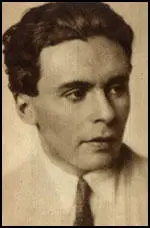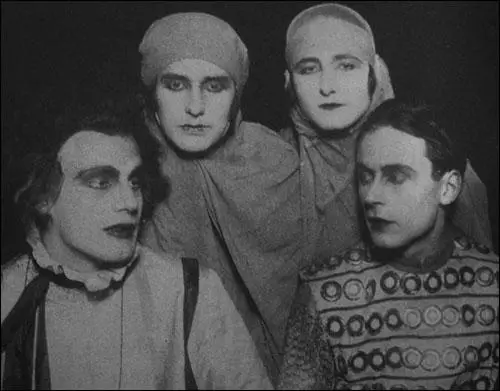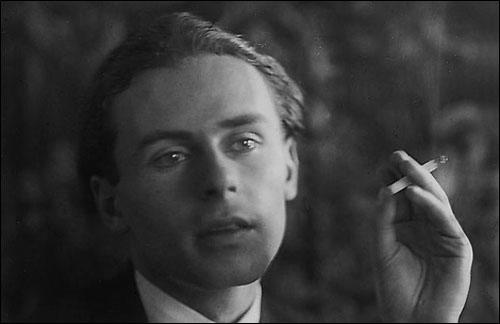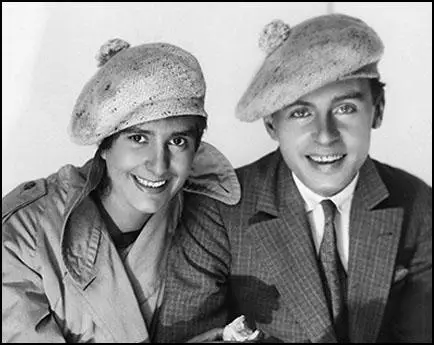Klaus Mann

Klaus Mann, the son of the novelist, Thomas Mann, was born in Munich on 18th November 1906. His mother, Katia Pringsheim Mann, was the daughter of a wealthy, Jewish industrialist family who owned coal mines and early railroads. (1)
His sister, Erika Mann, had been born the previous year. Erika and Klaus looked so much alike and were so emotionally close, they were known as "the twins". They both dressed similarly and celebrated their birthdays on the same date." They were followed by Gottfried (1909), Monika (1910), Elisabeth (1918) and Michael (1919). (2)
Although his mother came from a Jewish family, all the six children were baptised as Protestants. The Mann were considered to be very unconventional: "Mann had tainted his new family with scandal. It would trail him for years; literary gossip recounted how Katia strolled hand-in-hand with her brother Klaus; while the Mann's oldest children, Erika and Klaus, with their penchant for shared wardrobes, appeared to some observers the 1920s answer to Siegmund and Sieglinde." (3)
At the age of eleven, Klaus nearly died of a reptured appendix. (4) According to Colm Tóibín, Thomas Mann made clear his own sexual interest in Klaus (nicknamed Eissi). In 1920, when Klaus was 14, he wrote in his diary: "Am enraptured with Eissi... terribly handsome in his swimming trunks. Find it quite natural that I should fall in love with my son... It seems I am once and for all done with women?... Eissi was lying tanned and shirtless on his bed, reading; I was disconcerted." Later that year he wrote, "came upon Eissi totally nude" and was "deeply struck by his radiant adolescent body; overwhelming". (5)
Klaus Mann - Writer
With a group of friends, Erika and Klaus, they founded an experimental theater troupe, the Laienbund Deutscher Mimiker. In 1924 Klaus wrote Anja and Esther, a play about "a neurotic quartet of four boys and girls" who "were madly in love with each other". The following year he was approached by the actor Gustaf Gründgens, who wanted to direct the play with himself in one of the male roles, Klaus in the other; Erika Mann and Pamela Wedekind, the daughter of the playwright Frank Wedekind, would be the two young women. "Klaus planned to marry Pamela, with whom Erika fell in love, while Erika arranged to marry Gustaf, with whom Klaus began an affair." (6)
The play, which opened in Hamburg in October 1925, attracted vast amounts of publicity, partly because of its scandalous content and partly because it starred three children of two famous writers. A photograph appeared on the cover of Berliner Illustrierte Zeitung. It created a great deal of controversy as "Klaus's lipstick gave him the look of a transvestite". (7)

Gustaf Gründgens, Erika Mann, Pamela Wedekind, and Klaus Mann (1925)
The Mann family lived in luxury. Gottfried later wrote, "thanks to the Nobel Prize and the tremendous earnings of The Magic Mountain. They took trips, they ate and drank well, and two large cars stood in the garage: an open American car and a German limousine. When they went to the theatre, the chauffeur waited in the lobby with their fur coats at the end of the performance. This style of life, which they went to no trouble to conceal, made their growing number of political enemies hate them all the more". (8)
Anthony Heilbut, the author of Thomas Mann: Eros and Literature (1995), has commented: "Klaus Mann was gifted with charm, almost overburdened with status - a canny performer who had learned from cabaret stage and sexual prowl to gauge his public. He made himself at home everywhere, disregarding geographic borders, collapsing one time period into another, history into autobiography. He was almost too easy to psychoanalyze." (9)
Nazi Germany
On 24th July, 1926, Erika Mann married Gustaf Gründgens, but the marriage was not successful. In 1927, she and Klaus traveled around the world. (10) On her return to Germany she divorced Gründgens, who was sympathetic to the Nazi Party. She began a passionate affair with Pamela Wedekind, who at that time was engaged to her brother, Klaus Mann. Erika also had a relationship with the actress Therese Giehse, and appeared in the film about lesbianism Mädchen in Uniform (1931). It was a great success but because of its subject matter it was banned in the United States. (11)
Colm Tóibín has pointed out that during this period Erika and Klaus "wrote articles and books and made outrageous statements; they travelled, they had many lovers. Erika worked in the theatre and appeared in films, Klaus wrote more plays. In other words, they took full advantage of the freedoms offered by the Weimar Republic. For many in the Nazi Party, they were the epitome of all that was wrong with Germany. And their mother’s Jewish background didn’t endear them to the National Socialists either." (12)

Klaus Mann (c. 1932)
Klaus remained engaged to Pamela Wedekind until her marriage to Carl Sternheim. He continued to write and by 1932 he had published a dozen books and several plays. As Hermann Kurzke points out: "His plays for the theatre provoke scandals but appear on the great stages in Hamburg and Berlin, in Vienna and Munich." (13)
Klaus and Erika Mann joined together with a group of left-wing activists, including Therese Giehse, Walter Mehring, Magnus Henning, Wolfgang Koeppen and Lotte Goslar, to establish a cabaret in Munich called Die Pfeffermühle (The Peppermill). (14)
The production opened on 1st January, 1933. Klaus and Erika wrote most of the material, much of which was anti-Fascist. It ran for two months next door to the local Nazi headquarters, and, since it was so successful, was preparing to move to a larger theatre when the Reichstag went up in flames. Erika and Klaus were on a skiing holiday while the new theatre was being decorated and arrived back in Munich to be warned by the family chauffeur, that they were in danger. Later, Klaus wrote that the chauffeur "had been a Nazi spy throughout the four or five years he lived with us... But this time he had failed in his duty, out of sympathy, I suppose. For he knew what would happen to us if he informed his Nazi employers of our arrival in town." (15)
Adolf Hitler gained power in January 1933. Soon afterwards, a large number of writers were declared to be "degenerate authors". This included Heinrich Mann, Bertolt Brecht, Hans Eisler, Ernst Toller, Thomas Heine, Arnold Zweig, Ludwig Renn, Karl Marx, Sigmund Freud, Franz Kafka and Hermann Hesse. On 10th May, the Nazi Party arranged the burning of thousands of "degenerate literary works" were burnt in German cities. (16)
However, Thomas Mann's work still remained popular in Germany and unlike his brother, Heinrich, had made no statements attacking the regime. His biographer, Hermann Kurzke, has argued that during the period before he took power, Mann developed friendships with some significant figures in the Nazi Party: "Does that make Thomas Mann a precursor of Fascism? He certainly made an effort to stay out of the way of the resurgent right-wing movement of the time. Very early on in the summer of 1921, he took note of the rising Nazi movement and dismissed it as ‘swastika nonsense’. As early as 1925 when Hitler was still imprisoned in Landsberg, he rejected the cultural barbarity of German Fascism with an extensive, decisive and clearly visible gesture." (17) However, others had pointed out, he had always been careful not to attack Hitler in print. (18)
Thomas Mann was on holiday in France when Hitler took power. Erika and Klaus were warned by the family chauffeur that the Mann family were in danger. (19) Later, Klaus wrote that the chauffeur "had been a Nazi spy throughout the four or five years he lived with us... But this time he had failed in his duty, out of sympathy, I suppose. For he knew what would happen to us if he informed his Nazi employers of our arrival in town." (20)
Erika made contact with her parents, and warned them not to return to Munich. Mann, who was on holiday at the time, was warned that he faced the possibility of being arrested if he returned to Germany. In September, 1933, Thomas, Katia, Gottfried, Monika, Elisabeth and Michael Mann settled in Küsnacht, near Zurich. Erika and Klaus decided to remain in Germany to continue the fight against fascism. (21)
Mephisto
Klaus Mann went to live in Amsterdam, where he worked for the exile magazine Die Sammlung, which attacked Adolf Hitler and his government in Nazi Germany. In 1934 Klaus Mann published the first part of his autobiography, Journey into Freedom. (22)
The following year Klaus wrote to his mother that his publisher, Fritz Helmut Landshoff, made him a "relatively generous offer", where he was to receive a monthly wage to write a novel. (23) Klaus originally intended to write a utopian novel about Europe in the 22nd century. The author Hermann Kesten suggested that he write a novel about a homosexual who is willing to compromise his ideals in order to have a successful career under Hitler. (24)
Klaus accepted his advice and based his novel on his former friend and brother-in-law, Gustaf Gründgens, who was the artistic director of the Prussian State Theatre and was later appointed a member of the Prussian state council by Hermann Göring. Gründgens also starred in several propaganda films. He was also director of Berlin's principal theatre, the Staatstheater. One critic claimed that "Gründgens is emblematic of the intellectual who chooses ego and career, even in the service of monsters, over principle." (25)
The novel, Mephisto (1936), portrays an actor Hendrik Höfgen (Gustaf Gründgens), who in his youth was a communist. However, unlike, Gründgens, he is not homosexual as Klaus was himself gay. He decided to use "negroid masochism" as the main character's sexual preference. In 1933, when Hitler gains power, he flees to Paris, because he expects to be persecuted for his left-wing activities. However, he is persuaded to return to Germany and takes the role of Mephisto. There are situations where Höfgen tries to help his friends or to complain about concentration camps, but he is always concerned not to lose his Nazi patrons. (26)
FBI and Klaus Mann
In 1938, Erika and Klaus reported on the Spanish Civil War. On their return to the United States the FBI kept a close watch on them. They were suspected of being secret supporters of the Communist Party of the United States. The FBI snoopers speculated that Erika may have had a sexual relationship with her brother, Klaus. "Confidential informants" told agents that the two were having an affair, one file reports. Erika Mann was described in the files as having her hair cut "in a short mannish bob with a part on the right side" and to be close to a group of political actors who were "members of the Hebrew race". In 1940 Erika agreed to work with the FBI and gave information on members of the German exile community, who she suspected of pro-Nazi connections. (27) As an anti-fascist Klaus saw nothing wrong with American communists. (28)

Erika Mann and Klaus Mann
Klaus Mann was a frequent FBI target. Even his postman was recruited as an informant. Klaus attracted attention partly because of his left wing politics, but also because of his homosexuality. FBI files refer to Klaus as "a well-known sexual pervert" with "communistic sympathies". When he stayed in the Bedford Hotel in New York City, an informant reported that a soldier "with fair complexion and dirty blond hair" stayed overnight with him regularly. (29)
Soon after the outbreak of the Second World War, Klaus and Erika Mann published The Other Germany (1940). In the book they argued: "Germany's structure... is regional. The Germans do not care to, and do not actually, accept dictation from Berlin. There are, moreover, simply too many Germans in Europe for one state. An empire comprising all Germans would always constitute an implied threat and a source of unrest for the Continent... The land of Europe's middle, the mediator between North and South, East and West, has no mission to rule, but the more profound and noble mission to unite and reconcile."
One reviewer claimed: "The Manns are weak on analysis of the tremendous economic problem that will arise if the totalitarian state is defeated. But their book is a strong and pertinent reminder of the cultural resilience and political talent Germany displayed under the Weimar Republic (whose constitution was as liberal a one as Europe had ever seen). If Europe after World War II is to be federal, as they hope, the Manns provide a logical line on the neglected question as to what sort of Germany should take part in the federation." (30)
Klaus returned with his parents to the US and sought citizenship only to find that he was once more under investigation by the FBI. So were his friends such as Hans Eisler and Bertolt Brecht were ordered to appear before the Un-American Activities Committee (HUAC). Eisler and Brecht both decided to leave the country. Mann described the behaviour of members of the HUAC such as John Rankin and J. Parnell Thomas as "fascistic". In his diary he wrote: "What oath would Congressman Rankin or Thomas take if forced to swear that they hated fascism as much as Communism?" (31)
Klaus Mann made several attempts to kill himself. (32) While in Los Angeles in 1948 he attempted suicide by slitting his wrists, taking pills and turning on the gas. Thomas Mann wrote to a friend: "My two sisters committed suicide, and Klaus has much of the elder sister in him. The impulse is present in him, and all the circumstances favour it – the one exception being that he has a parental home on which he can always rely." (33)
At the beginning of January 1949, Klaus Mann wrote in his diary: "I do not wish to survive this year." (34) In April, in Cannes, he received a letter from a West German publisher to say that his novel, Mephisto, could not be published in the country because of the objections of Gustaf Gründgens (the book is a thinly-disguised portrait of Gründgens, who abandoned his conscience to ingratiate himself with the Nazi Party). (35)
Klaus wrote to Erika about his problems with his publisher and his financial difficulties. "I have been luck with my family. One cannot be entirely lonely if one belongs to something and is part of it." (36) Klaus Mann died in of an overdose of sleeping pills on 21st May 1949. (37)
Erika and Thomas Mann were in Stockholm when they heard the news. Thomas wrote: "My inward sympathy with the mother’s heart and with Erika. He should not have done this to them... The hurtful, ugly, cruel inconsideration and irresponsibility." (38) Thomas wrote to Hermann Hesse: "This interrupted life lies heavily on my mind and grieves me. My relationship to him was difficult and not free of guilt. My life put his in a shadow right from the beginning." (39)
Thomas Mann decided not to attend his son’s funeral or interrupt his lecture tour. Later, Elisabeth Mann would say of Erika: "When Klaus died, she was totally, totally heartbroken - I mean that was unbearable for her, that loss. That hit her harder than anything else in her life." (40)
Primary Sources
(1) Colm Tóibín, London Review of Books (6th November, 2006)
Thomas and Katia Mann had six children. It was clear from early on that Katia most loved the second child, Klaus, who was born in 1906, and that Thomas loved Erika, the eldest, born in 1905, and also Elisabeth, born in 1918. The other three – the barely tolerated ones – were Golo, born in 1909, Monika, born in 1910, and Michael, born in 1919. Erika remembered a time during the shortages of the First World War when food had to be divided but there was one fig left over. "What did my father do? He gave this fig just to me alone . . . the other three children stared in horror, and my father said sententiously with emphasis: “One should get the children used to injustice early."
Some things ran in the family. Homosexuality, for instance. Thomas himself was gay most of the time, as his diaries make clear. So were three of his children: Erika (also just most of the time; she made an exception for Bruno Walter, among others), Klaus and Golo. Suicide was a family theme too. Both of Thomas Mann’s sisters committed suicide, as did his sons Klaus and Michael, as did the second wife of his brother Heinrich. Also, gerontophilia. Bruno Walter was almost as old as Erika’s father; and in 1939 Elisabeth married the literary critic Giuseppe Antonio Borgese, who was 36 years her senior.
And then there is the small matter of incest. Much interest in this was fuelled by incidents in Thomas Mann’s own work. In her useful and sympathetic book about the Mann family, In the Shadow of the Magic Mountain, Andrea Weiss writes: ‘Just how much Katia and Klaus Pringsheim loved each other was the subject of public gossip and private distress, especially when Thomas Mann, married to Katia for only a few months, used his wife’s relationship with her brother as the basis for one of his novellas.’ The novella, Blood of the Walsungs, dealt with the incestuous relationship between a twin brother and sister; Katia’s father attempted to have the story suppressed.
Such rumours also existed about Erika and Klaus, much encouraged by Klaus’s play on the subject, The Siblings, and made their way into Gestapo reports when the siblings went into exile and FBI reports about them once they arrived in America. (In the mid-1920s Klaus helped to keep things in the family by having an affair with Erika’s first husband, Gustaf Gründgens.) In his novel The Volcano, Klaus allowed the character based on his sister to marry the character based on his father. In Thomas Mann’s The Holy Sinner, the hero, Pope Gregorius, marries his mother – who is also his father’s sister.
In his diaries Thomas Mann made clear his own sexual interest in Klaus: "Am enraptured with Eissi," he wrote in 1920, when Klaus was 14 (Eissi was his nickname), "terribly handsome in his swimming trunks. Find it quite natural that I should fall in love with my son... It seems I am once and for all done with women?... Eissi was lying tanned and shirtless on his bed, reading; I was disconcerted." Later that year he "came upon Eissi totally nude and up to some nonsense by Golo’s bed" and was "deeply struck by his radiant adolescent body; overwhelming". He used some of this same language to describe Jacob’s interest in the young Joseph in Joseph and His Brothers, and in the novella Disorder and Early Sorrow, written when Elisabeth was seven, the relationship between the bookish father and his young daughter, clearly based on Mann’s relationship with Elisabeth, is heated and fervid enough to make any reader marvel at what a wonderfully daring imagination the old magician was in possession of.
Student Activities
Adolf Hitler's Early Life (Answer Commentary)
Adolf Hitler and the First World War (Answer Commentary)
Adolf Hitler and the German Workers' Party (Answer Commentary)
Sturmabteilung (SA) (Answer Commentary)
Adolf Hitler and the Beer Hall Putsch (Answer Commentary)
Adolf Hitler the Orator (Answer Commentary)
An Assessment of the Nazi-Soviet Pact (Answer Commentary)
British Newspapers and Adolf Hitler (Answer Commentary)
Lord Rothermere, Daily Mail and Adolf Hitler (Answer Commentary)
Adolf Hitler v John Heartfield (Answer Commentary)
The Hitler Youth (Answer Commentary)
German League of Girls (Answer Commentary)
Night of the Long Knives (Answer Commentary)
The Political Development of Sophie Scholl (Answer Commentary)
The White Rose Anti-Nazi Group (Answer Commentary)
Kristallnacht (Answer Commentary)
Heinrich Himmler and the SS (Answer Commentary)
Trade Unions in Nazi Germany (Answer Commentary)
Hitler's Volkswagen (The People's Car) (Answer Commentary)
Women in Nazi Germany (Answer Commentary)
References
(1) Richard Winston, Thomas Mann: The Making of an Artist (1982) page 225
(2) Frederic Spotts, Cursed Legacy: The Tragic Life of Klaus Mann (2016) page 6
(3) Anthony Heilbut, Thomas Mann: Eros and Literature (1995) page 196
(4) Hermann Kurzke, Thomas Mann (2002) page 274
(5) Colm Tóibín, London Review of Books (6th November, 2006)
(6) Colm Tóibín, London Review of Books (6th November, 2006)
(7) Anthony Heilbut, Thomas Mann: Eros and Literature (1995) page 437
(8) Colm Tóibín, London Review of Books (6th November, 2006)
(9) Anthony Heilbut, Thomas Mann: Eros and Literature (1995) page 441
(10) Time Magazine (10th October, 1938)
(11) Gwendolyn Audrey Foster, Women Film Directors: An International Bio-Critical Dictionary (1995) page 322
(12) Colm Tóibín, London Review of Books (6th November, 2006)
(13) Hermann Kurzke, Thomas Mann (2002) page 274
(14) Time Magazine (10th October, 1938)
(15) Colm Tóibín, London Review of Books (6th November, 2006)
(16) Peter Hoffmann, The History of German Resistance (1977) page 15
(17) Hermann Kurzke, Thomas Mann (2002) page 264
(18) Colm Tóibín, New Ways to Kill Your Mother: Writers and Their Families (2013) page 196
(19) Andrea Weiss, In the Shadow of the Magic Mountain: The Erika and Klaus Mann Story (2008) page 88
(20) Colm Tóibín, London Review of Books (6th November, 2006)
(21) Anthony Heilbut, Thomas Mann: Eros and Literature (1995) page 530
(22) Andrea Weiss, In the Shadow of the Magic Mountain: The Erika and Klaus Mann Story (2008) pages 99-100
(23) Klaus Mann, letter to Katia Mann (21st July 1935)
(24) Andrea Weiss, In the Shadow of the Magic Mountain: The Erika and Klaus Mann Story (2008) page 126
(25) Stefan Steinberg, The Rehabilitation of Gustav Gründgens (29th December 1999)
(26) Andrea Weiss, In the Shadow of the Magic Mountain: The Erika and Klaus Mann Story (2008) page 126
(27) Martin Kettle, The Guardian (22nd September, 2000)
(28) Andrea Weiss, In the Shadow of the Magic Mountain: The Erika and Klaus Mann Story (2008) page 117
(29) Martin Kettle, The Guardian (22nd September, 2000)
(30) Time Magazine (26th February, 1940)
(31) Thomas Mann, diary entry (5th October, 1947)
(32) Anthony Heilbut, Thomas Mann: Eros and Literature (1995) page 453
(33) Colm Tóibín, London Review of Books (6th November, 2006)
(34) Klaus Mann, diary entry (1st January, 1949)
(35) Colm Tóibín, London Review of Books (6th November, 2006)
(36) Klaus Mann, letter to Erika Mann (20th May, 1949)
(37) Andrea Weiss, In the Shadow of the Magic Mountain: The Erika and Klaus Mann Story (2008) page 239
(38) Thomas Mann, diary entry (May, 1949)
(39) Thomas Mann, letter to Hermann Hesse (6th July, 1949)
(40) Colm Tóibín, London Review of Books (6th November, 2006)
